- Latest articles
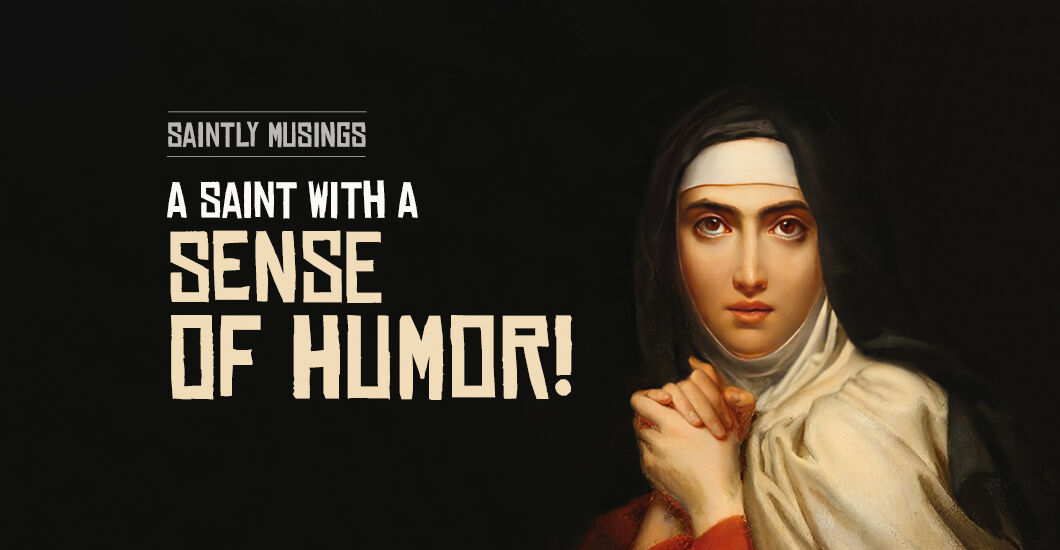
The river had swelled so high that water covered everything and all sense of where the road or footpath might be was purely a guess. With water everywhere, it seemed foolish to advance, especially in a carriage, for if anyone strayed ever so little off the road, they would perish without a doubt.
As her companions panicked, Sister Teresa encouraged them, “As we are engaged in God’s work, how could we die in a better cause?” She then led the way on foot to the convent through the fierce storm. Suddenly she slipped down an embankment and fell squarely into the mud.
Instead of complaining or cursing, the irrepressible nun, looked to the sky and quipped, “If this is how you treat your friends, no wonder you don’t have many!” The sixteenth-century Saint and Doctor of the Church, Teresa of Avila, didn’t take herself or this world too seriously and brushed off the little hardships of life with a sense of humor.
Her ability to humbly recognize her own faults and need for grace was also tinged with her refreshing humor. In her autobiography, Teresa writes, “Having virtuous and God-fearing parents would have been enough for me to be good if I were not so wicked.” Saint Teresa was also mindful of false piety and once said, “From silly devotions and sour-faced saints, good Lord, deliver us!”
A healthy and good sense of humor will keep our head straight and enable us to see the world’s true beauty. Did God say that we need to be “sour-faced” to be holy? So, if you want to become a saint, lighten up, share the joy of the Lord and laugh with your friends like Jesus did.
'
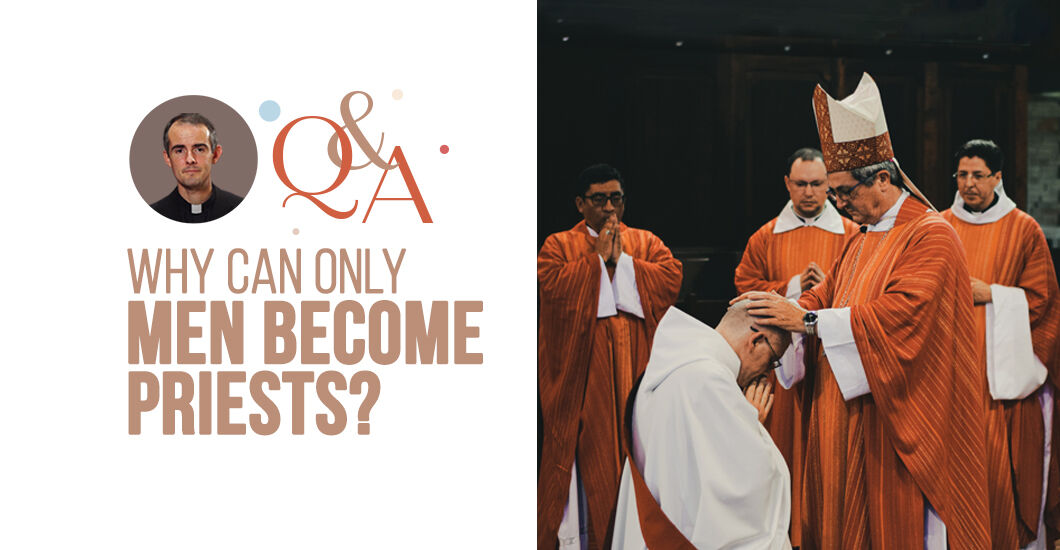
Q – Why is it that only men can become priests? Doesn’t that discriminate against women?
A – A body has many parts, each of which has a unique role to play. An ear cannot be a foot, nor should an eye desire to become a hand. For the whole body to function well, each part has a critical role to play.
Similarly in the Body of Christ (the Church), there are many different and beautiful complementary roles to play! Not every person is called to be a priest, but all are called to be saints in their own specific vocation.
The priesthood has been reserved to men for several reasons. First, Jesus Himself chose only men to be His Apostles. This is not just due to the culture of the times, as some have claimed. Jesus often broke cultural norms in His relationships with women—He bantered with the Samaritan woman, He welcomed women into His entourage, He chose them to be the first to witness the Resurrection. Jesus bestowed a remarkable dignity and honor upon women, treating them asequals—but He did not choose them for the unique role of Apostle. Even His own mother Mary, who was holier and more loyal than all of the other Apostles, was not selected as an Apostle. The Apostleswere the first bishops, and all priests and bishops can trace their spiritual lineage to the Apostles.
A second reason is because when a priest celebrates the Sacraments, he is standing “in persona Christi” (in the person of Christ). A priest does not say, “This is Christ’s Body”—no, he says, “This is MY Body”. He does not say “Christ absolves you” but rather, “I absolve you.” It makes me tremble, as a priest, to take these words of Christ as my own! But as the priest stands in the person of Christ the Bridegroom, giving of himself to His Bride (the Church), it is fitting that a priest be a male.
A final reason is because of the order of creation. We first see God create rocks and stars and other inanimate objects. No big deal. Then God creates plants—we have life! Then God creates animals—life that moves and is conscious! Then God creates man—life that is in His image and likeness! But God is not yet finished. The highpoint of His creation is woman—the perfect reflection of God’s beauty, tenderness, and love. Only a woman can bring forth life as God does; a woman is created to be relational, as God loves relationship. So, one can state that woman is the pinnacle of God’s creation.
The vocation of priesthood is centered around service and laying down one’s life for the flock. Therefore,it would not be appropriate for womento serve men, but rather for men to serve women. Men are created to defend, protect, and provide for others—the priesthood is one way in which he lives out that calling, as he defends and protects souls from the Evil One, and provides for the Church through the Sacraments. A priest should be laying down his life for the souls entrusted to his care!
It is a modern error to think that leadership equals power and oppression. Because of original sin, we often see people abuse leadership roles, but in the Kingdom of God, to lead is to serve. In this light, priesthood is a calling to sacrifice, to imitate Christ even to the Cross. It is a uniquely masculine role.
Thisin no way means that women are second-class citizens in the Church! Rather, their calling is equal but different. Many heroic women have given their lives for Christ as martyrs, virgins, consecrated religious, missionaries, leaders—in a uniquely feminine way, bearing spiritual life, nurturing relationships, uniting themselves to Christ the Bridegroom.
What a beautiful thing it is to have such a wide variety of different but complementary vocations in the Church!
'

Whether you know it or not, when you seek truth, you seek God.
One warm summer day as a boy of nine, I went for a walk with a couple of friends. One of my friends, who was a little older, brought an air rifle with him. As we walked through a cemetery, he pointed to a bird on top of the church roof and asked if I thought I could hit it. Without giving it a second thought, I took the gun, loaded, and took aim. The moment I squeezed the trigger, a cold feeling of death fell over me. Before the pellet had even left the gun, I knew I was going to hit this living creature and it would die. As I watched the bird fall to the ground, I experienced sadness and guilt, and confusion swept over me. I questioned why I had done it, but I had no answer. I had no idea why I gave my consent, but I felt empty and numb. As with many things in life, I buried the event inside and soon forgot about it.
Déjà vu
In my late twenties, the woman I was in a relationship with became pregnant. When we found out, we hardly confided in anybody.. I didn’t expect any support or advice anyway, and it didn’t seem that big a deal. I convinced myself I was doing the ‘decent thing’–assuring her I would support any decision she made, whether to keep the baby or have an abortion. For several reasons, we decided to end the pregnancy. What helped me arrive at the decision was the legality of abortion in this country and the great number of people who procure abortions. How could it be that bad? Ironically, raising children of my own was always the biggest dream of my life.
We made the appointment with the abortion ‘clinic.’ Going there felt like a simple trip to the chemist to pick up a prescription, so much so, in fact, that I waited outside in the car, oblivious to the magnitude and impact this decision would have. When my girlfriend came out of the building, I at once saw the change in her. Her pale face projected ‘Death.’ The emotions I had felt as a nine-year-old boy shooting the bird flooded over me. We travelled home in silence, and barely spoke about it again. But we both knew something had changed us that day, something tragic, something dark.
Freedom
A couple of years later, I was accused of a crime I hadn’t committed and placed on remand in HMP Manchester (Strangeways Prison) to await trial. I began to speak to God in my heart and for the first time in my life I began to pray the Rosary properly. After a few days, I began reviewing my life, scene by scene, and I saw many blessings I had received, but also my many sins.
When I got to the sin of abortion, for the first time in my life I realized clearly that it had been a real living baby growing in the womb, and that it was my child. The realization that I had chosen to end my own child’s life broke my heart, and while crying on my knees in that prison cell I said to myself, ‘I can’t be forgiven.’
But it was in that very moment that Jesus came to me and spoke words of forgiveness, and I knew there and then that He had died for my sins. I was instantly flooded with His love, mercy, and grace. For the first time my life made sense. I deserved death but received life from the One Who said, ‘I am the Life’ (John14:6). No matter how great our sins may be, I realized, God’s love is infinitely greater (John 3:16-17)!
An Encounter
Recently, sitting in a London train station waiting for my train, I silently asked Jesus to bring someone on board that I could witness to about him. When I took my seat, I found myself facing two women. After a while we began to chat and one of them asked about my faith and if I had always been a believer. I shared some of my past, including the abortion, and explained that the moment I realized I had taken the life of my own child I came face to face with the crucified Christ, and was forgiven and set free.
Instantly the pleasant mood changed. I had hit a nerve and one of the women started screaming at me. I reminded her she had asked for my story, so I was only answering her question. Unfortunately, there was no reasoning with her. She screamed “It isn’t a baby in the womb!” with the other woman nodding in agreement.
I sat patiently and then asked what them what makes what is in the womb “a baby.” One answered “DNA,” and the other agreed. I told them that DNA is present the moment a baby is conceived, and gender and eye colour are already decided. Again, they screamed at me to a point where one of them was shaking. After an awkward silence, I said I felt so sorry she had gotten so upset. It turned out this woman had had an abortion many years before and was clearly still carrying wounds from the experience. When she stood to get off, we shook hands, and I assured her of my prayers.
Unbound
The tragedy of ending an innocent life in the womb is scarcely spoken about today, and when it is, we hear much misinformation and even lies rather than the facts. Choosing to abort a child is not a one-off, done-and-dusted decision, with no lasting negative effects. The pro-choice movement insists that “it’s the mother’s body, so it’s her choice.” But there is more than the mother’s body and choice to consider. There is a tiny, miraculous life growing in the womb. As the father of an aborted baby, I can honestly say that my healing has been a process, which has been ongoing even until this day.
Thanks be to God those who seek the truth can find it, if only they open their hearts. And when they come to know the ‘Truth’, the ‘truth will set them free’ (John 8:31-32).
'
Are you struggling with procrastination, lukewarmness and boredom? Here are 7 spiritual vaccinations to boost your soul’s immunity
Usually we associate the devil with darkness and the night. But there is a worse enemy that lurks when the sun is at its highest, we traditionally call it ‘the noonday devil.’ You begin the day with great enthusiasm and passion, but as it gets close to noon you lose your interest and vigor. This is not a physical fatigue, but more a deflation of the soul.
The Desert monks called this acedia, meaning lack of care. This vice is also known as sloth, one of the seven deadly sins, which does not stand by itself, but opens the door to other vices. After having an encounter with the Lord, a soul embarks on the spiritual journey with great passion. But to continue in the same spirit is not easy. After a few weeks or months, laziness or lack of motivation to do anything can beset the soul. This state of indifference, a boredom in the soul, is characterized by a numb spiritual emptiness.
Acedia can be described as a spiritual depression. No activity may be pleasing at this stage. Sloth threatens people in all stages of life. It is the cause of many evils. Obviously, it prevents us from working out our salvation. The noonday demon is “the most oppressive of all the demons” (Evagrius Ponticus). It is oppressive in the sense that it brings to mind how difficult it is to practice religious faith or the ascetic life. It suggests that there are many ways to serve God, so one does not necessarily have to regularly pray or perform religious exercises.
This mindset takes away all spiritual joy, and opens the doors for joys of the flesh to become the overriding motivation. One of the tricks of this demon is to ensure that a person does not realize that they are afflicted, instilling a distaste for spiritual matters, leading a person to excessive reliance on earthly pleasures until these also lose their delight. Bernard of Clairvaux speaks of this as a sterility, dryness, and barrenness of one’s soul that makes the sweet honey of Psalm-singing seem tasteless, and turns vigils into empty trials.
Temptations of Acedia
Acedia is the ultimate breakdown of one’s capacity to love oneself and others. This makes a spirit lukewarm. The Scripture speaks of them: “I know your works: you are neither cold nor hot. Would that you were cold or hot! So, because you are lukewarm, and neither cold nor hot, I will spew you out of my mouth” (Revelation 3: 15-16). How do you know if you’re under the oppression of the noonday devil? Examine your life and see if you face the following struggles.
One major sign is procrastination. Procrastination does not mean that you are doing nothing. Youmay be doing everything except for the one thing you were supposed to be doing. Is that you right now?
There are three forms of sloth: occupying oneself with unnecessary things, distraction, and spiritual melancholy or depression. Someone afflicted with the spirit of sloth may involve themselves in multiple things, without focusing on anything. They vacillate from one thing to another. Moments of stillness and peace are very difficult to acquire at this point. Lack of listening to the voice of God makes the soul terribly void. Distraction disrupts focus and recollection, leading to the minimization of prayer and spiritual exercises. This weariness leads to postponing everything. This experience of an interior void and weariness causes spiritual depression. There is a secret anger within. Under this affliction someone feels like criticizing everyone, without personally doing anything creative.
Turning to the Onions
Instability is another sign of this evil -inability to focus on your own vocational call. Symptoms of instability may be excessive desire to change one’s locality, work, situation, institution, monastery, spouse, or friends. Listening to gossip, entertaining unnecessary debates and quarrels, and complaining about everything are some of the expressions of this acedia-spirit. When they are subject to this, people behave like naughty children: as soon as one desire is fulfilled, they want something else. They may begin reading a book, then jump to another book, then to the cell phone, but never finishing any task. At this stage, someone may feel like even faith or religion is of no use. Losing direction eventually takes a soul into dreadful doubt and confusion.
The third sign is exaggerated bodily interests: feeling unable to be in the company of what is distressful and unpleasant for long. The sorrow of the soul leads one to look for alternative sources of joy, then moves on to other things that give pleasure. Saint Thomas Aquinas once said: “Those who find no joy in spiritual pleasures, have recourse to pleasures of the body.” When spiritual joy disappears, a soul will automatically turn to the pleasures of the world or to the inordinate appetites of the body, tending to regress to the sins that had been renounced and left behind, craving for “the onions of Egypt” (Numbers 11:5). Someone who fails to look to the heavenly manna that the Lord serves every day will definitely start craving for “the onions of the world”.
A frozen heart can be yet another sign of a lukewarm soul. The Scripture says about such a soul: “the sluggard says, there is a lion in the road! There is a lion in the streets! As a door turns on its hinges, so does a sluggard on his bed. The sluggard buries his hand in the dish; it wears him out to bring it back to his mouth” (Proverbs. 26: 13-15). Again, it says, “a little sleep, a little slumber, a little folding of the hands to rest” (Proverbs 6: 7). Remember the fall of King David. When the armies were at the battleground, the military leader remained in the palace, seeking his own petty interests. He was not where he should have been. Laziness led him to lust, and later to even more heinous sins. An unstructured day leaves the soul more prone to succumb to evil desires. Later, David wrote regretfully of “the pestilence that stalks in darkness, or the destruction that wastes at noonday” (Psalms 91: 6).
Overcoming Acedia
Desert fathers like Evagrius Ponticus, John Cassian and others have proposed several ways to combat the noonday devil. Let us explore seven of them:
1.Turn to God in tears: Genuine tears mark the sincerity of the desire for a Savior. They are the outward expression of an inner desire for God’s help. God’s grace is necessary to overcome acedia.
2. Learn to speak to your Soul: Keep reminding yourself of the blessings you have already received. You may motivate your spirit by thanking the Lord for all His merits. When you thank the Lord, you experience an uplifting of the spirit. In Psalms, David says: “Why are you cast down, O my soul, why are you disquieted within me? Hope in God; for I shall again praise Him, my Savior and my God” (Psalms 42:5). “Bless the Lord, O my soul, and forget not all his benefits, who forgives all your iniquity” (Psalms 103: 2). This is a fail-safe tactic to fight the demon. I personally, have found this approach very powerful.
3. Perseverance leads to greater desire to do what is good: Desire drives action. Persistent desire is required to overcome spiritual laziness of the soul. Hyper-activism will not make you holy. In our cyber age, one may easily fall into superficial relationships, social media addictions, and real dangers to purity of heart and body. Boredom of the soul and dulling of conscience makes one want to live like everyone else, losing the grace to gaze at the transcendence. We must learn to practice stillness and solitude. For this, we must intentionally set apart a few moments for prayer and meditation. I suggest two simple yet profound ways to do this:
(a) Throw some ‘arrow prayers’ to charge the soul. Make short invocations like, “Jesus, I trust in you.” or, “O Lord, come to my assistance.” or “Jesus help me.”Or you can say the ‘Jesus prayer’ consistently: “O Lord Jesus, Son of David have mercy on me, a sinner.”
(b) Pray the Surrender Novena: “O Jesus, I surrender myself to You, take care of everything.”
You can recite these short prayers frequently, even while brushing, showering, cooking, driving, etc. This will help cultivate the presence of the Lord.
4. Go to the Sacrament of Penance: A spiritually lukewarm soul resists going to Confession. But, you must do it frequently. This is actually a reset button in your spiritual life that can get you back on track. You may be repeatedly confessing the same sins, and doing the same penance for years! Just do it at once. Share your spiritual status with the Confessor. You will receive an amazing grace.
5. Surround yourself with Holy things: Read about saints. Watch good inspiring Christian movies. Listen to the challenging stories of missionaries and missions. Read a short passage of the Scripture every day; you can begin by reading the book of Psalms.
6. Devotion to the Holy Spirit: The third Person of the Trinity is our Helper. Yes, we need help. Pray: “O Holy Spirit, fill my heart with your love. O Holy spirit, fill my emptiness with your life and spirit.”
7. Meditations on Death: Evagrius considered self-love as the root of all sins. By meditating on death, we remind ourselves that “we are but dust, and to dust we shall return.” Saint Benedict taught the rule: ‘To keep death daily before one’s eyes.” Death-contemplation is not to wallow in morbid thoughts but rather to make us vigilant and to commit ourselves to the mission more passionately.
These are seven ways to help a soul beat the noonday devil. They are like spiritual vaccinations to boost your soul’s spiritual immunity. Thirst for the Lord will be quenched by “the One” who puts thirst for Him in every soul.
'
The Rosary Stops a Serial Killer
Much has been written about the notorious serial killer, Ted Bundy. But here is a story that is only now gaining wide attention. And it gives powerful witness to the miraculous power of the rosary.
On January 15, 1978, after taking the lives of two college students living in the Chi Omega sorority house of Florida State University, Bundy began combing the house for more victims. Carrying a bat, Bundy entered the room of his intended next victim, but suddenly stopped where he stood. Then he suddenly dropped the bat and left.
The police wanted to know why this girl had survived the attack—why had Bundy stopped just inside her room and fled? The girl agreed to speak with the police, but only if there was a priest in the room. So,the officers called a nearby parish. Though he was not the priest on call that night, the phone rang in the room of Fr. William Kerr (later Msgr. Kerr) and he quickly rushed to the scene.
The traumatized girl told the priest of a promise she had made to her grandmother when she had left home to start college. Each night, no matter how late she went to bed, she would pray the Rosary, to invoke the protection of the Blessed Mother. Yes, every night, even if she fell asleep after just a few decades. And in fact, that’s what had happened the night of the killings. Though sound asleep, she still clutched the rosary in her hands when Bundy entered her room. She stirred and saw a bat-wielding man standing over her. Without thinking, she opened her hands, exposing the rosary. Bundy saw the beads and immediately left.
Weeks later, Fr. Kerr received another late-night call, though again he was not the priest on duty. This time, the caller was the warden of the nearby prison. Bundy had just been apprehended and requested to speak with a priest. Fr. Kerr met with Bundy that night and continued to receive regular calls from him up to and including the night before Bundy’s execution, when he thanked Fr. Kerr for the help he had given him.
Bundy confessed to having committed over thirty murders in his lifetime. But one life, the life of a young girl who had made a promise to her grandmother, that life he didn’t take. Was that life spared because rosary beads fell from her hands? Bundy never said. But we can be sure that there is power in the Rosary, that there is safety under the mantle of Mary’s protection, and that there is spiritual growth and sustenance that comes from praying the mysteries of Christ’s life, death, and resurrection.
'
It is a relentless saga when trying to find the truth but a quick renewal when truth itself finds you
Pope Emeritus Benedict XVI was once asked what book he would want to have with him if ever he found himself stranded on a desert island. Along with the Bible he chose St Augustine’s Confessions. Some might have found the choice surprising but I think I agree. Having just gone through the book again for the fourth or fifth time I found myself even more engrossed in it than ever before. The first half of the book which recounts his conversion story is especially engaging.
Like The Story of a Soul by St Thérèse this book feels at once more familiar after several readings and yet somehow more filled with new lights. What St Augustine does is to instruct us in how to pursue something which is fundamental to spiritual growth, namely, the attainment of self-knowledge. He traces the thread of the working of God’s grace, as well as his own sinfulness, from his earliest memories right through to the time of his conversion and beyond. He even goes back further than his own memories can take him and writes of what he was told of his babyhood by others. The little detail about him being prone to laughter during his sleep as a baby is particularly endearing.
After this fourth or fifth reading, I have been left pondering something which I would like to share with you in this short article. It has to do with the influence of his youthful friendships. Parents cannot be vigilant enough when it comes to the question of their children’s friends. So many of us have been drawn away from whatever little virtue we had in our youth by the example and enticement of our wayward companions. Augustine was no different. Life in the fourth century sounds surprisingly similar to life in our own day.
Pears and Peers
Augustine’s famous story of the stealing of the pears illustrates the point. He probes his memory for the motivation behind the decision to rob an orchard, even though he had better pears at home and wasn’thungry. Most of the pears ended up being thrown to the hogs. He knew full well at the time that what he was doing was an act of gratuitous injustice. Did he do evil then purely for the sake of doing evil? Yet, this is not the way that our heart is generally disposed. Sin in us is normally the perversion of some good. In this case, it was done out of a kind of rambunctious camaraderie and the mocking delight of a group of friends at the thought of the outrage of the owners of the orchard.
It was friendship gone awry that was its motive. Augustine would never have done such a thing alone, but only because he was spurred on by his peers. He was desperate to impress them and to have his share in their act of mindless mischief. Friendship is one of God’s greatest gifts, but friendship warped by sin can have ruinous effects. The eloquent lament of the saint unmasks its danger, “O friendship all unfriendly! You strange seducer of the soul, who hungers for mischief from impulses of mirth and wantonness, who craves another’s loss without any desire for one’s own profit or revenge—so that, when they say, “Let’s go, let’s do it,” we are ashamed not to be shameless.” (Confessions. Book II, 9).
Captivity
There is a similar pattern in relation to the sin which would become fatal poison for Augustine’s soul and which could have led to his eternal perdition. The sin of lust also took hold of his heart as he journeyed with his friends ever further out upon what he calls the “stormy fellowship” of human life. In the company he kept during his teenage years it became the custom to want to outdo one another in lasciviousness. They would boast of their exploits and even exaggerate the real scale of their immorality to impress one another. The only thing that they were by now ashamed of was innocence and chastity. His holy mother had warned him sternly in his sixteenth year to avoid fornication and to stay away from other men’s wives. He would later write to the Lord about his arrogant dismissal of her admonitions, “These appeared to me but womanish counsels, which I would have blushed to obey. Yet they were from Thee, and I knew it not.” (Confessions.Book II, 3) What began with one or two sins of the flesh became a habit before long, and sadly for Augustine, this evil habit would later begin to feel like a necessity. What started as a boast to his friends finally enchained his will and took on a life of its own within him. The demon of lust had found its doorway into the throne room of his soul through a vain longing to impress.
The Spark of Truth
After reading Cicero at age nineteen, the saving grace of his intellectual quest to discover wisdom was sparked off. This passionate search would lead him through the study of different schools of philosophy, gnosticism, and a prolonged pondering of the problem of evil. All the while, this journey ran parallel to the sexual immorality which had engulfed his life. His mind was groping upwards for light, but his will was still mired in the mud of sin. The climactic point of this journey, when both tendencies within him would at last clash violently, came at around the age of thirty-two. It was then that the struggle which would determine his eternal fate—and whether or not he would become a light for all subsequent generations of Christians or simply disappear into darkness—broke into a raging interior inferno.
After listening to the sermons of the great Saint Ambrose and after reading the letters of Saint Paul, there could be no more doubt in his mind that in the Catholic Church alone would he find the truth he had always sought. It was clear to him now that Jesus Christ was his heart’s true desire and yet he was powerless to break the chains of lust which had shut that same heart up in a prison of vice. He was too sincere in the face of truth to think that he could ever come to life in Christ without a willingness to die to grave sin.
War and Liberation
The final battle which would decide the war for his soul followed upon a discussion with his friends about some illustrious Romans who had left everything behind to follow Christ. (Now the presence of good friends was beginning to right the wrongs of youth.) Seized with a holy desire to follow the example of the saints, and yet unable to do so because of his attachment to lust, an emotional Augustine stormed out of the house into the garden. Seeking out a place of solitude, he allowed the tears of regret and inner frustration to finally flow freely. They were to prove cleansing tears.
The moment had at last come when he was ready to let go. He consented to release his grip on sin for good. No sooner had this holy spiritual desire overcome his inordinate desire for physical pleasure than he heard a child’s voice singing repeatedly, “Take and read.” He interpreted this as a command from Almighty God placed upon the lips of babes. Rushing back to the house to take up the book of Saint Paul’s letters which he had left on the table, he told himself that he would accept whatever words his eyes first fell upon as an expression of the will of God for his life. This was what he read, “Let us conduct ourselves becomingly as in the day, not in reveling and drunkenness, not in debauchery and licentiousness, not in quarrelling and jealousy. But put on the Lord Jesus Christ, and make no provision for the flesh, to gratify its desires.” (Romans 13:13-14)
Triumph
Along with these words of Sacred Scripture, supernatural light was infused into his soul. Only moments after truly desiring to be delivered for the first time ever, deliverance was now his. The chains which had fettered his will for so long, subjecting it to the tempestuous rule of the passions, had been smashed to pieces by the grace of Christ the Liberator. His tormented soul was permitted to enter instantly into joy, peace, and the freedom of the children of God. In that momentous hour for the whole Church, the man once enslaved to lust through the unfortunate company kept as a youth had died and one of the most influential saints of all time had suddenly come to life.
Looking back years later, it was hard for the saint to believe that he could have ever allowed such paltry trifles to hold him back from the Lord and the ecstatic joys that would be given him in Christ. He had been like one clinging desperately to worthless trinkets while priceless treasure was held out to him. The Protestant scholar R.C. Sproul sums up the consensus of all Christians about the monumental importance of what happened on that day, “If there is any giant that stands out in the history of the Church as the man upon whose shoulders the whole history of theology stands, it is a man by the name of Aurelius Augustine, Saint Augustine.”
'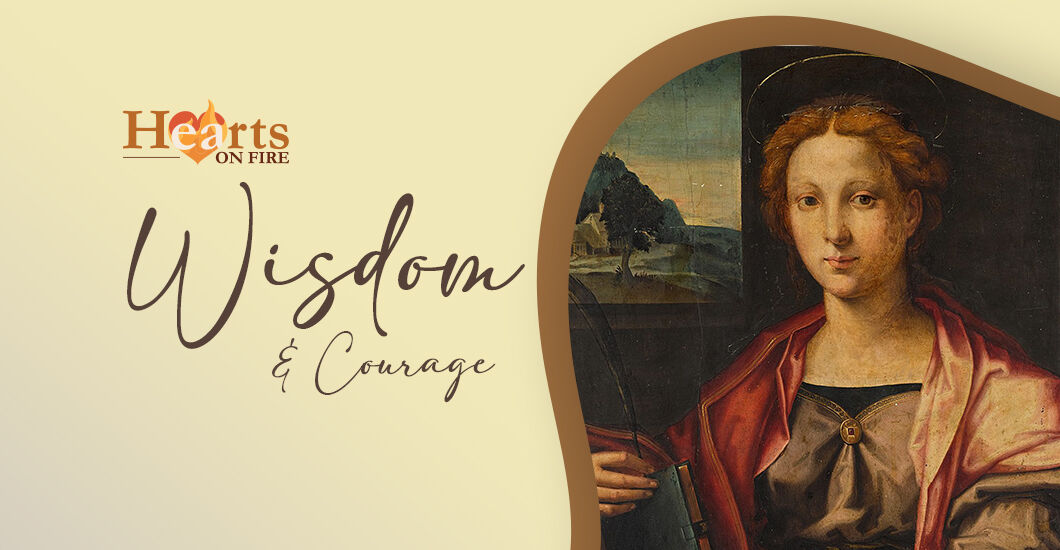
Venerated as one of the fourteen Holy Helpers (intercessors invoked especially against diseases) Saint Catherine of Alexandria is a virgin martyr of the late third century and early fourth centuries. Though there are no primary sources that attest to her life, there are many traditions about her kept alive over the centuries, including the fact that Joan of Arc claimed hers as one of the voices that spoke to her.
Born around 287 in Alexandria, Egypt, a cultural and educational center of the ancient world, she was of the noble class and a very gifted student. She embraced Christianity at age 14 after seeing a vision of Jesus and His blessed mother.
A precocious young woman, she didn’t hesitate at the age of 18 to challenge the emperor Maxentius when he began to cruelly persecute the Christian community. The emperor was so impressed by her wisdom that, rather than execute Catherine, he ordered her to debate his best philosophers, whom she easily bested. In fact, the philosophers were so taken by her wisdom, that they and some 200 soldiers embraced the faith. Sadly, all were immediately martyred.
Frustrated by Catherine’s amazing resilience, the emperor ordered that she be jailed and tortured. But even her brutal scourging did not cause Catherine to give up her faith. So, the emperor tried a novel approach: he offered to marry her and make her an empress. Already wedded to Christ and having dedicated her virginity to him, Catherine refused the emperor.
Enraged, the emperor ordered that she be executed on a spiked wheel, an especially brutal means of torture. But when Catherine touched the wheel, it miraculously shattered. Finally, the emperor commanded she be beheaded.
Especially popular during the medieval period, devotion to Catherine spread during the crusades and she has remained popular in both the Roman Catholic and Orthodox churches. Celebrated in much renaissance art, Catherine is the patroness of students and teachers, librarians, and lawyers. Her feast is celebrated on November 25.
May her courage and her wisdom in accepting death rather than abandoning her faith in Christ inspire us and give us hope.
Saint Catherine of Alexandria, pray for us.
'
At Mass one day, after distributing Holy Communion, Saint Philip Neri saw a man leave the church just moments after he had received the Eucharist. The man seemed to lack awareness of the Real Presence of Jesus in the consecrated host he had just received. The good priest felt he had to do something to help the man understand how disrespectful his action was, so he quickly asked two altar boys to take their lighted candles and follow the man through the streets of Rome. Soon, the man realized the altar boys were following him. Puzzled, he returned to the church to ask Fr. Neri about it.
Saint Philip told the man, “We must pay proper respect to Our Lord, whom you are carrying away with you.
Since you neglected to adore Him, I sent two acolytes to take your place.” The man was deeply touched by these words, and resolved to be more aware of Jesus’ presence in his heart after each Holy Communion.
Our Lord Jesus is truly and substantially present in the Eucharist, and the minutes following Communion are ‘golden moments’ when we can have a heartfelt conversation with Him. He is present in our souls to listen to our every petition, carry our every burden, and bestow every grace we need. Let us be mindful of His loving presence, and spend at least a few minutes in thanksgiving and adoration after each Holy Communion.
'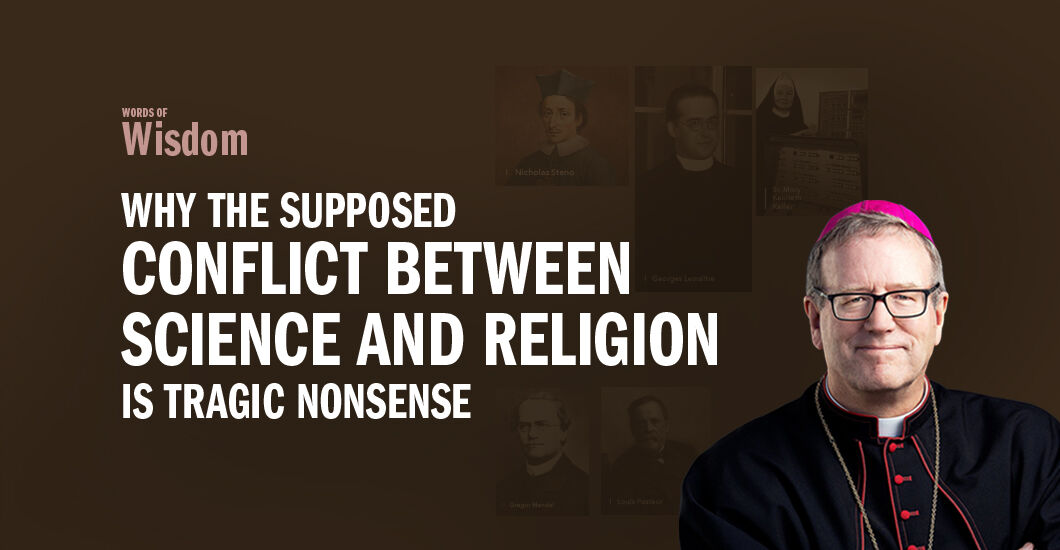
Just last week, I had the joy of speaking at Youth Day at the Los Angeles Religious Education Congress. My audience was about four hundred high school students from around the country, and my topic, at the request of the organizers of the congress, was the relationship between religion and science. They knew, as I have been arguing for years, that a major reason that many young people are disaffiliating from our churches is the supposed conflict between science and the faith. I told my young audience that this “war” is in fact a fantasy, an illusion, the fruit of a tragic misunderstanding. And I attempted to show this by looking at four themes, which I will briefly summarize in this article.
First, in a very real sense, the modern physical sciences came from religion. The great founders of science—Kepler, Copernicus, Galileo, Newton, Descartes, etc.—were, without exception, trained in ecclesially sponsored schools and universities. It was under the aegis of the church that they took in their physics, their astronomy, and their mathematics. More specifically, they learned in those institutions two essentially theological truths necessary for the emergence of the experimental sciences—namely, that the universe is not God and that the universe, in every nook and cranny, is marked by intelligibility. If nature were divine—as indeed it is considered to be in many religions, philosophies, and mysticisms— then it could never be an apt subject for observation, analysis, and experimentation. And if nature were simply chaotic, void of form, it would never yield up the harmonies and patterned intelligibilities that scientists readily seek. When these two truths, which are both a function of the doctrine of creation, obtain, the sciences can get underway.
Second, when science and theology are properly understood, they are not in conflict, since they are not competing for primacy on the same playing field, like opposing football teams. Utilizing the scientific method, the physical sciences deal with events, objects, dynamics, and relationships within the empirically verifiable order. Theology, employing an entirely different method, deals with God and the things of God—and God is not an object in the world, not a reality circumscribed within the context of nature. As Thomas Aquinas put it, God is not ens summum (highest being), but rather ipsum esse (the act of being as such)—which is to say, God is not a being among beings, but instead the reason why there is an empirically observable universe at all. In this way, he is like the author of a richly complex novel. Charles Dickens never appears as a character in any of his sprawling narratives, yet he is the reason why any of those characters exist at all. Accordingly, the sciences, as such, can never adjudicate the question of God’s existence nor speak of his activity or attributes. Another type of rationality—not in competition with scientific rationality—is required for the determination of those matters.
And this brings me to my third point: scientism is not science. Sadly rampant today, especially among the young, scientism is the reduction of all knowledge to the scientific form of knowledge. The undeniable success of the physical sciences and the extraordinary usefulness of the technologies to which they have given rise have produced in the minds of many this conviction, but it represents a tragic impoverishment. A chemist might be able to tell us the chemical makeup of the paints that Michelangelo used on the Sistine Ceiling, but he couldn’t, qua scientist, tell us a thing about what makes that work of art so beautiful. A geologist might be able to tell us the stratification of the earth below the city of Chicago, but he could never, again qua scientist, tell us whether that city is being justly or unjustly governed. There isn’t a trace of the scientific method in Romeo and Juliet, but who would be so stupid as to assert that that play tells us nothing true about the nature of love. In a similar way, the great texts of the Bible and the theological tradition are not “scientific,” but they nevertheless speak the profoundest truths about God, creation, sin, redemption, grace, etc. Both the cause and effect of scientism, sadly, is the attenuation of the liberal arts in our institutions of higher education. Rather than appreciating literature, history, philosophy, and religion as conduits of objective truth, many today relegate these to the arena of subjective feeling or subject them to withering ideological criticism.
My fourth and final point is this: Galileo is one paragraph in one chapter of a very long book. The great astronomer is often invoked as the patron saint of heroic scientists struggling to free themselves from the obscurantism and irrationality of religion. The censorship of his books by the Church, and the great scientist’s virtual imprisonment at the behest of the pope, is taken as the dark paradigm of the Church/ science relationship. Obviously, the Galileo episode was hardly the Church’s finest moment, and in point of fact, John Paul II, expressing real contrition, explicitly apologized for it. But to use it as the lens for viewing the play between faith and science is crucially inadequate.
There have been, from the earliest days of the modern sciences, thousands of deeply religious people involved in scientific research and investigation. To name just a handful: Copernicus, revolutionary cosmologist and a third order Dominican; Nicholas Steno, the father of geology and a bishop of the Church; Louis Pasteur, one of the founders of microbiology and a devout Catholic layman; Gregor Mendel, the father of modern genetics and an Augustinian friar; Georges Lemaître, formulator of the Big Bang theory of cosmic origins and a Catholic priest; Mary Kenneth Keller, the first woman in the United States to receive a doctorate in computer science and a Catholic religious sister. I believe it is fair to say that all of these figures understood the fundamental points that I have laid out in this article and therefore saw that they could be utterly devoted to both their science and their faith.
In conclusion, I might especially urge Catholic scientists today— researchers, physicians, physicists, astronomers, chemists, etc.—to talk to young people about this issue. Tell them why the supposed warfare between religion and science is in fact a delusion, and even more importantly, show them how you have reconciled them in your own life. We simply cannot allow this silly justification for disaffiliation to stand.
'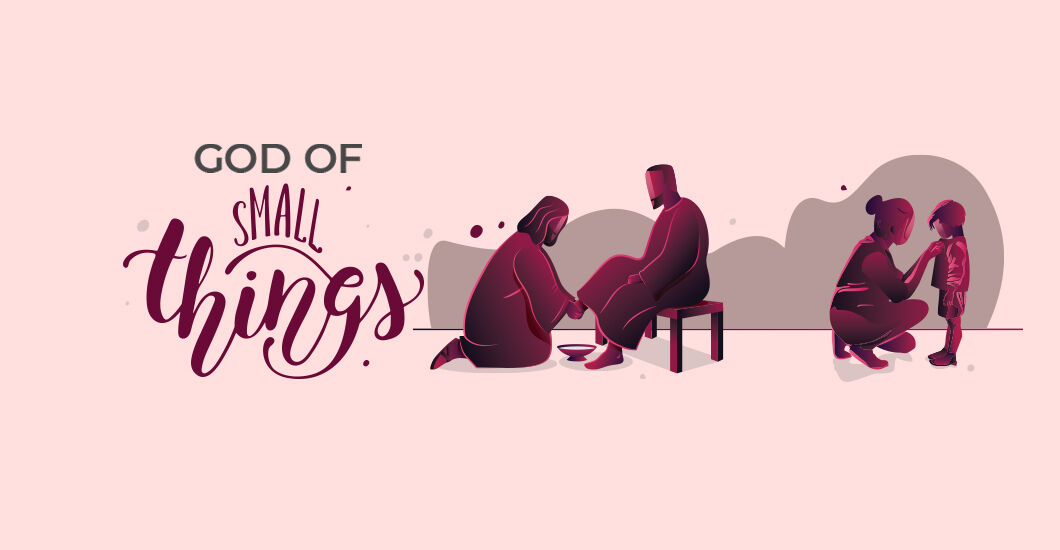
What seems to be insignificant in our daily lives can hold immense value from Heaven’s perspective. Hard to believe? Read on to find out more…
“Do Small Things with Great Love” —my T-shirt features this well-known quote from Mother Teresa. Although I often wear the T-shirt at home, I had never considered its message deeply. Who really wants to do small things or even regard them as important? To be honest, most of us dream of doing something big, something extraordinary and remarkable which will bring us applause, admiration, recognition, self-satisfaction, and a sense of greatness.
The world tells us to go big or go home. We are only admired and considered great when we are successful in every area of life. So, somehow, we have subscribed to this notion—Big things = Greatness.
True Greatness
For most of my life, I’d believed the same thing. Perhaps this was why I was never quite content. I begged God to change my circumstances. I cried millions of tears for being given children with special needs. I wanted a different life. Being there for my children’s needs felt like being trapped between four walls at home.
I looked for meaning and purpose outside of God’s plans. Instead of paying close attention to what He wanted me to do, I pursued my own wishes. I refused to do “small things” in order to do big things merely for recognition. I preferred doing different things, and works which I thought would bring value to my life along with a sense of greatness and fulfillment.
I had it all wrong. Instead of being content in the realm where God had placed me, I was creating my own kingdom for my own happiness and glory. It took years for me to understand that greatness doesn’t come from doing my own will, proving my own worth to the world, gaining accolades or even showcasing my talents and skills. Rather it comes from remaining at the center of God’s will. Greatness comes from influencing, impacting, and serving in my own home, among my own community. Sometimes this realm may seem small and insignificant, but serving with love as He did will ultimately reveal the greater picture of His plans.
As Tony Evans says in his book, Destiny, “When you are living your life according to God’s purpose, He will cause all things in your life to blend together for good. When you are committed to Him above all else, He will measure everything in your life—the good, bad, and bitter and blend them into something divine.”
In essence, everything in your life, even the smallest, can yield a significant outcome for His glory when you remain faithful to the little you have been entrusted with (remembering the Parable of the Talents Matthew 25).
The Master’s Example
Jesus redefines greatness by showing us a way which is contrary to the world. Small things = Greatness. Jesus said to His disciples, “Whoever wants to become great among you must be your servant, and whoever wants to be first must be your slave” (Matthew 20:26 – 27).
He reiterated that over and over again, and demonstrated it on the night before He died when He knelt before His apostles and washed their feet.
We often regard “service” as insignificant and beneath us, but Jesus shows us, in every word and action, what tremendous significance the smallest things can have in building His Kingdom. In His parables, He compares those actions to a tiny mustard seed which grows into the greatest of trees, or a pinch of yeast which makes dough grow and become more palatable. He chose to be born in a common stable instead of a royal palace. He noticed and valued the greater worth of the widow’s two coins amidst the great wealth cast into the treasury from what others had to spare. He transformed the gift of a boy’s lunch into an all-you-can-eat feast for over five thousand. He invited little ones to come to Him even when He was tired. He compared Himself to a good shepherd who notices one sheep missing from the flock and seeks it out in the dark. He compared His death to a kernel of wheat which falls to the ground and dies, but ultimately brings forth a great harvest.
He proclaimed that the very least people are the most precious in the sight of God. Small things are considered great in His kingdom! He demonstrated this to us by becoming one of us. “The Son of Man did not come to be served, but to serve, and to give his life as a ransom for many” (Matthew 20:28). To truly follow Him, I need to be prepared to put others’ needs ahead of my own, and to give myself in the service of others, treating each person I meet as I would like to be treated.
In his book, In Charge, Dr Myles Munroe writes, “Greatness in our materialistic world is defined as fame, popularity, scholastic or economic achievement and notoriety. Greatness may result from these qualities, but they are not the definition of greatness. Rather greatness comes from your service to the world. When you serve with your gifts, you become significant to humanity and people will describe you as ‘great’. In summary, greatness is significance. It comes from the value you add to others’ lives by serving them. Greatness isn’t about how many people are serving you, rather how many you are serving through your life.”
So What Makes You Great?
You are great when you are serving others. You are great when you are doing that less-appreciated job to fulfill the needs of your family. You are great when you are looking after a loved one who is unwell. You are great when you are making a difference in the lives of the underprivileged with your time and talents. You are great when you are encouraging a friend. You are great when you are letting your life make a dent in the universe with a positive force. You are great when you are cooking meals for your family. You are great when you are raising your kids. And you are great when you do small things with great love!
'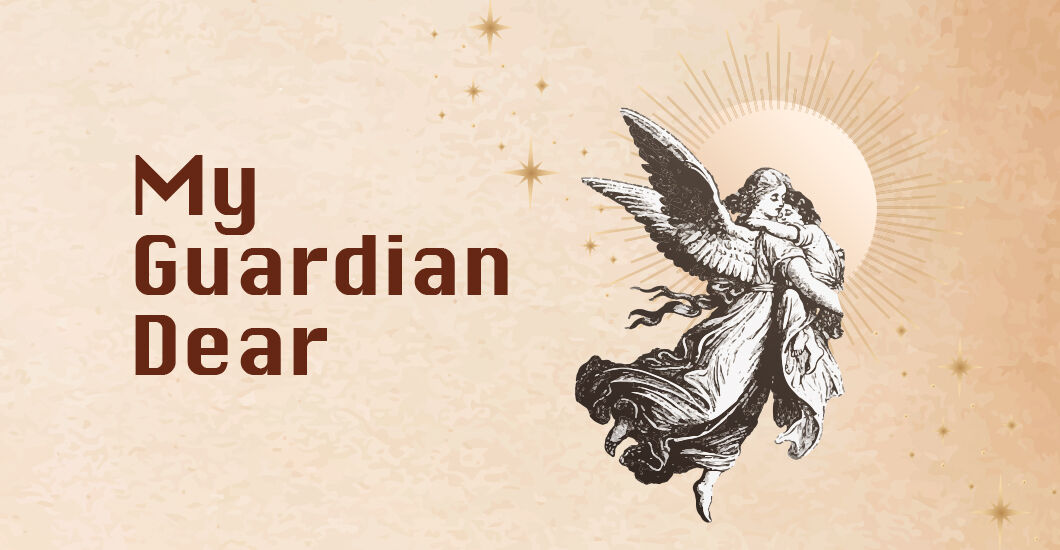
We know each of us has a guardian angel. But how often do we ask for his help?
The first time I realized my guardian angel was my best hope was when I was scheduled to teach three workshops at a Christian writing conference several hours away by car. I woke up with a horrible migraine and cried as I wondered how I would manage the drive. I did not want to be unprofessional and cancel at the last minute. I cried because there is an element of shame in being chronically ill—I suffer from migraine headaches that can debilitate me for nearly half the days in a month—and I did not want to admit how weak I was. So, I prayed to my angel to bring me safely there and back. I still don’t know how I made the long drive. I put on my Rosary CD, and then listened to the Gospel of John, thinking how beautiful it would be to have Jesus upon my heart if I were to die. Not that I wanted to die. My children were still young. My husband would miss me. And I was loving my writing life even more since we had converted to Catholicism. I wanted everybody to have what I had—Jesus!
And boom! The revelation hit me—my guardian angel isn’t here just to protect me from bodily harm but to make sure I get to Heaven. Heaven! That’s the goal. God loves us so much He appoints an angel from the moment of our conception to guard and protect us from all dangers, and to guide us to our eternal home. This awareness, which I’ve had since I was a small child, still astounds me. As a child, I had complete trust in God’s protection. But the problem of suffering, so present in my life, was difficult to reconcile with belief in an omnipotent God. So, at age twelve I lost my faith, and ended my invocations to my guardian angel. But, without my knowledge, my angel was still guiding me.
I am very thankful to my angel for protecting me from death during my twenties because had I died then, my intellect so clouded by sin, I might have rejected God’s mercy and gone to Hell. It is by the grace of God, and the patience and long-suffering of my guardian angel, that I’ve been able to hear His promptings and return to God, and when my plans derail, to pray “not my will but Thine”. I am also returning to that childhood state of complete trust and surrender. If I am anxious about anything, I ask my angel to take care of the situation. I call upon the guardian angels of my children when I’m at the brink of losing my patience. I also call upon the angels of the people to whom I want to be a faithful witness. What a comfort it is to draw upon heavenly assistance.
Guardian angels carry our prayers and offerings to the throne of God; they come to the Holy Sacrifice of the Mass with us, and if we are unable to attend, as it was for many during the pandemic, we can ask our angel to go in our place to praise and adore our blessed Lord. These heavenly creatures are a gift to us. Let us always remember they are watching over us and want us to reach Heaven! Cultivate a relationship with your angel. They are God’s gift to each of us.
Dear angel! Ever at my side. How loving must thou be
To leave thy home in Heaven to guard a guilty wretch like me.
~ Fr. Frederick William Faber (AD 1814-1863)
'